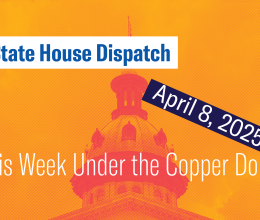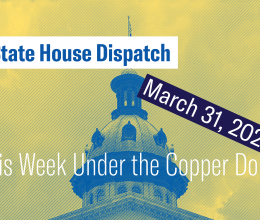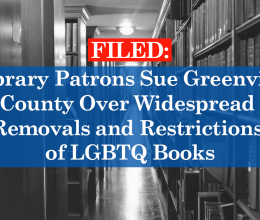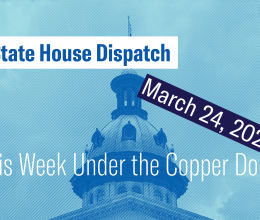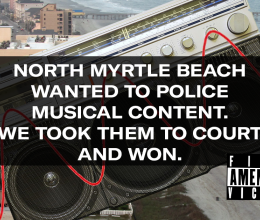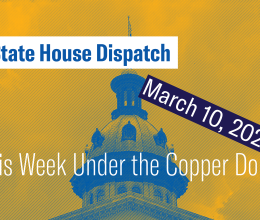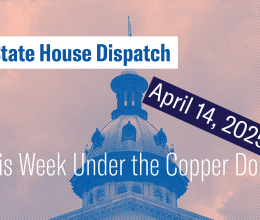
October 12, 2014. Charleston Post & Courier. By Glenn Smith. This man, who did not want his name used, was hoping for money from drivers making the left turn from Spring Street onto Lockwood Drive on Wednesday.
Cars rumble by Alan Schwartz in a haze of exhaust as he stands at a main gateway to the city of Charleston with a tattered sign in hand, his lips pursed and eyes fixed forward on the line of traffic moving down a ramp from the Ravenel Bridge.
Dressed in camouflage pants, an old T-shirt and a worn New York Yankees cap, Schwartz clasps a piece of cardboard with a message scrawled in magic marker: "Homeless veteran, please help."
If he's lucky, someone will stop when the light at Morrison Drive turns red and hand him a buck, some loose change or a coupon for a sandwich. "But some people just cuss and curse at you, or throw something at you and yell 'Get a job (expletive)!'," he says.
Until recently, Schwartz and other panhandlers also risked a trip to jail or a stiff fine for standing out in public and asking for a handout. But the city decided to toss out its ban on begging earlier this year after the American Civil Liberties Union and the Homeless Justice Project challenged the panhandling ordinance as an unconstitutional violation of free speech.
"In this country, statutes that punish citizens based upon the content of their speech have long been suspect," says Victoria Middleton, executive director of the ACLU of South Carolina. "While this principle may appear to be about panhandling, it is really about the potential abuse of governmental power.
Charleston Police Chief Greg Mullen says the city has no desire to trod on anyone's rights, but authorities also are mindful of concerns from citizens who feel uncomfortable or intimidated by people cornering them on the street looking for a handout.
"There's a balance there that we need to be sensitive to," he says. "We want to make sure we follow the law and that their rights are protected. But at the same time, we want to make sure they are not being aggressive and intimidating people."
The new ordinance, enacted in March, still allows police to go after panhandlers who block sidewalks, hound people on the street or otherwise get too aggressive in their quest for a donation. The ordinance also bars panhandlers from soliciting within 50 feet of ATM machines, outdoor dining areas, churches, schools and several other spots. But by and large, city streets are now fair game.
Mullen says police have seen a noticeable increase in panhandlers since the change went into effect, both on the peninsula and West Ashley.
One man lounges on King Street with a sign asking for money so he can buy "weed and beer." Another hunkers down along Lockwood Boulevard with a sign that says he needs money because he is too ugly to work as a prostitute. And most any day, you can find folks like Schwartz manning the off-ramps coming into the city from all directions. What's more, some work in groups, taking scheduled shifts along lucrative patches of public property.
"It's frustrating because what you're seeing is not just individuals, but teams of them popping up," Mullen says. "But when you look around the country, everyone is trying to figure out a way to manage this."
A national debate
That is true. Communities from Hawaii to Pennsylvania have grappled with similar challenges to their efforts to curb street soliciting, with the First Amendment usually trumping their gripes about the practice.
As U.S. District Judge Robert Jonker wrote in a 2012 opinion striking down a Michigan panhandling law, "Begging plainly conveys a message: it communicates, whether verbally or non-verbally, a request for financial or material assistance."
Different communities in this area take different approaches. Mount Pleasant, for instance, has no panhandling ordinance and officers generally try to steer beggars to social service agencies rather than jail. Summerville has an ordinance but officers don't make many arrests, and usually just try to make sure panhandlers aren't on the roadway or private property. North Charleston bans folks from soliciting at traffic lights, and cites panhandlers found to be causing a nuisance.
The city of Charleston has a long history of trying to rein in panhandling on its streets. For years, the city forbade begging anywhere, under a 1975 ordinance that said: "No person shall wander or go from door to door or place himself in any public way or place to beg or receive alms for himself."
Some King Street merchants hung signs a few years back to the message even plainer. "Please do not feed the bums," they read.
Still, concerns over the blanket prohibition caused the city to retool its ordinance in 2007, adding a requirement that beggars obtain a permit to solicit from the city. Since few, if any, actually came forward to do so, the net effect was about the same.
Challenge prompts change
Representatives from the ACLU and the Homeless Justice Project approached the city last fall to challenge the constitutionality of the ordinance, and those talks led to the city backing off its hard-line approach to the panhandling. That was the fair thing to do, Middleton says.
"From 2007 until 2014, police officers in Charleston regularly asked pedestrians, 'What did that person say?' if a street artist or panhandler spoke to them," she says. "If the response was that 'he or she asked me for money,' then the police could ticket or arrest the person making that request. Typically the police would engage in this sort of investigation when someone who appeared to be poor engaged in a conversation with another pedestrian. Many people were serially arrested and spent many nights in jail as a result of this policy."
Police statistics show that since 2009, two people have been arrested for aggressive soliciting, 14 for soliciting in prohibited areas and 389 for soliciting without a permit. The vast majority of those arrests were for panhandling, Mullen says. It could not be determined how long those people spent in jail as a result, but these misdemeanor crimes carry a maximum punishment of 30 days or a $262 fine.
Residents have noticed the sudden growth in panhandling in the absence of such arrests, and they've expressed their displeasure to police.
Angela Drake, president of the Historic Ansonborough Neighborhood Association, says residents and tourists alike feel ill at ease being approached by panhandlers. It detracts from the city's charm, and residents in her neighborhood are concerned it will increase even more when make-overs to two parks in the area are completed, she says.
"For the safety of the residents and the tourists, it's just not appropriate in the city of Charleston," she says.
Schwartz, the panhandler, said he knows some folks are put off by his pleas. Truth be told, he says, he would rather not have to ask for a handout. He says he is a former Army vet who served in Iraq, and he worked as a mechanic until an injury to his hand sidelined him. His family home was lost to foreclosure when his dad died, and he has been homeless since May, living under the Ravenel Bridge and taking turns with other poor folks pandering for money at the Morrison Drive ramp, he says.
"This has been my first time doing this," he says. "It's embarrassing. I don't like doing this. But I have to survive."

